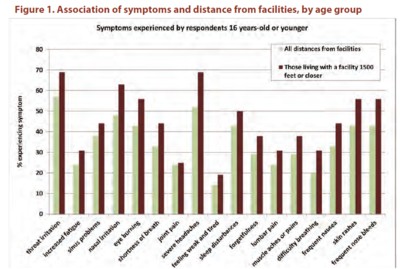
The study brings much needed quantifiable data to the discussion surrounding the health impacts of shale drilling and its related infrastructure. Air and water tests accompanied the health data of 108 residents in 14 PA counties. Butler county residents account for 11% of the participants.
The report shows a direct correlation between proximity to a facility (well, waste impoundment pit, compressor station) and the prevalence of symptoms.
- In all counties except one (Bradford) the most common health symptom reported is sinus/respiratory problems.
- 40% of households (22/55) reported that pets and livestock began to have symptoms (such as seizures or losing hair) or suddenly fell ill and died after gas development began nearby.
- 15 of those surveyed stated that their symptoms lessened or disappeared when they were away from home.
- Members of 4 households moved to new locations due to gas drilling and several others stated that they would if their finances and jobs allowed it.

 RSS Feed
RSS Feed
